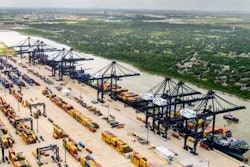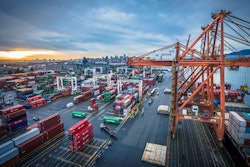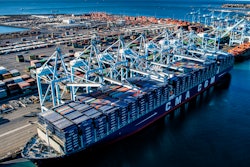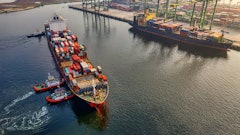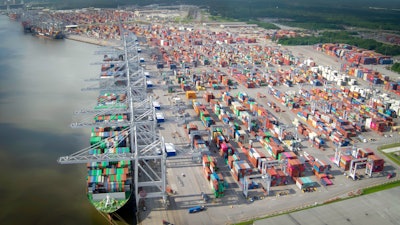
About five years ago, then-PortFresh CEO Brian Kastick had a brilliant idea—what if Georgia’s Port of Savannah could be used for importing fresh fruit and vegetables?
Kastick, who became a key account executive with Americold when the company acquired PortFresh in January 2019, had been importing onions from Peru through the Port of Philadelphia, but it had never been done through the South Georgia port. The reason? Before 2014, the U.S. Department of Agriculture did not allow it. Ninety-five percent of the imported fruits and vegetables entering the U.S. East Coast came through Northeast ports and were trucked to customers in the Southeast and points beyond.
The reason Southeast ports were bypassed? Too risky. The Mediterranean fruit fly could not survive in the climate of the U.S. Northeast, but could in the Southeast, and that meant the pathogens it carries could also enter the country. At the time, there were no plans, processes, or local infrastructure in place to alleviate the pest in the Southeast, so a blanket directive restricted chilled fruit and vegetable imports.
New Rules, New Routes
Georgia Ports Authority’s Chris Logan, senior director of trade development, beneficial cargo owner sales, explains that, “For chilled cargo importers that aim to serve the U.S. Southeast, speed to market and the cost of overland transit have been traditional challenges.”
The introduction of the USDA’s Southeast In-Transit Cold Treatment Pilot program about four years ago started to change that, however.
“The previous regulatory environment required produce from South America to enter the U.S. through one of three regions: South Florida, Philadelphia/New York, and LA/Long Beach,” notes Logan. “Since 2015, the U.S. Department of Agriculture has allowed the Port of Savannah to serve as a new entry point for cold-treated produce.”
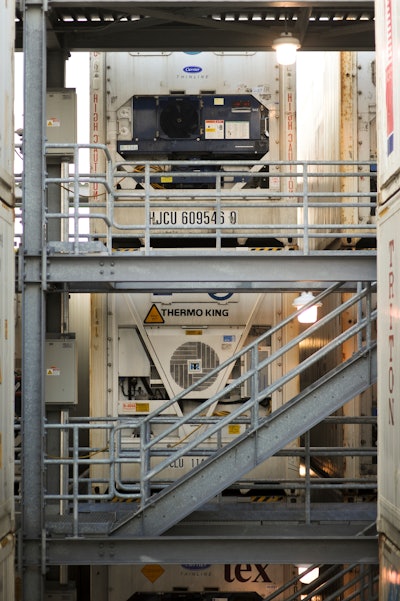 Reefer containers stacked at the
Reefer containers stacked at the
Port of Savannah.
Previously, “Cargo undergoing cold treatment had to complete the process and be certified prior to arrival in Savannah. This meant additional days of transit and reductions to shelf life,” he says. However, “The new rule allows produce destined for Southeast markets to avoid third-country layovers. And, because Savannah is hundreds of miles closer to major Southeastern markets such as Atlanta, landing chilled cargo at Garden City Terminal cuts transportation times by five to seven days. The shorter transit saves fuel and reduces emissions.”
Logan adds, “This opens the door for more customers—including large retailers and producers—to take advantage of faster, more cost-effective transit options to serve U.S. consumers with fresher produce via the Port of Savannah.”
GPA’s expanding chilled cargo portfolio includes South American blueberries, mangos, citrus, grapes, avocados, bananas, apples, pears and plums, as well as fresh fruit and vegetables from specific growing regions in Morocco, Italy and Spain.
Following the USDA’s authorization allowing the Port of Savannah to serve as an entry point for cold-treated produce, Kastick invested in a 182-acre parcel of land within 20 miles of the port, with direct road access and rail potential. He built a modern chilled storage facility with 6,500 pallet positions and state-of-the-art cold treatment, fumigation, repack and inventory management systems, all under one roof.
PortFresh was born, and the region gained a facility with the ability to pack and ship shelf-ready fruits and vegetables, from boxed to bagged, as well as inventory reporting to customers as required.
At the outset, the PortFresh team secured a contract with a massive international grocery and convenience megastore chain, setting itself up for success.
Location, Location, Location
Today, the Americold PortFresh Savannah campus is growing at a rapid rate. Now a part of Americold’s integrated facility network, the local team works closely with the Port of Savannah and with a growing list of perishable import customers. For its biggest customer, the company handles dozens of lines of fresh fruits and vegetables, including onions, asparagus, grapes, citrus, avocados, apples, pears, kiwi, peaches, plums, and nectarines.
The Port of Savannah is impressive too. It’s the largest single-terminal container port in the northern hemisphere. The port handles just under 40 services a week and moves about 12,000 containers a day in and out, and the port authority recently dredged the Savannah River so that the largest container ships can access the port.
But perhaps the port’s best feature, for international produce providers, is its location. It’s one of the first available U.S. ports of call for vessels coming through the Panama Canal or from the east coast of South America.
For growers, one of the advantages of the closer port is extended shelf life and a greater percentage of saleable product as a result of products being available sooner. At the Americold PortFresh campus, product is offloaded from containers directly into a 100-percent refrigerated facility, so it never sits in non-refrigerated space and the cold chain is never broken.
In addition, the Americold PortFresh campus is entirely new, designed from the ground up with all the value-added services needed to send and receive fresh produce fast, all under one roof. For example, grapes leave Chile, travel two weeks across the ocean to Savannah, GA, offload into the perfectly cooled Americold PortFresh warehouse and within a week are in the grocery store.
Thanks to the pioneering work of the Americold PortFresh team and Brian Kastick, more and more importers are realizing the viability of the Port of Savannah connection. Italian Kiwi and Argentinian pears are coming into Savannah for the first time, joining the list of fresh food arriving from other parts of the world into the thriving Southeastern port daily.
And in its latest expansion phase, the Americold PortFresh campus is adding a frozen temperature facility to support food and protein exporters through the Port of Savannah. Slated to be completed in the spring of 2020, the 37,000-plus pallet position facility will offer a complete portfolio of services, including one of the highest volume blast-freeze capabilities in the country.





